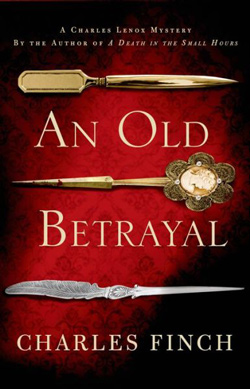 An Old Betrayal by Charles Finch is the seventh book in the Charles Lenox Victorian mystery series (available November 12, 2013).
An Old Betrayal by Charles Finch is the seventh book in the Charles Lenox Victorian mystery series (available November 12, 2013).
Charles Finch continues his popular Charles Lenox mysteries in An Old Betrayal. In this latest offering, Lenox is very busy with his Parliamentary duties and happily married to Lady Jane. Although he has surrendered most of his detecting, he occasionally comes out of his semi-retirement to investigate. This time, his protégé Dallington, who is too ill to work on his latest case, asks for Lenox’s help. Dallington is too ill to meet the writer of a terrified letter begging for help, so Lenox goes in his stead. The intimidation and threats of their client soon develop into something much more complicated and serious, and by the finish, three people have been murdered and the future of the Empire is at risk.
An Old Betrayal is a twisty mystery about a captivating time and place. Although Victorian England has been mined by other authors, Finch writes with an unusually light touch. Even when Finch displays his social conscience, he focuses upon the positive. Writing about one of his government duties, visiting charities, Finch writes:
The kitchen was housed in a long room, with a massive marble countertop at one end where eager young men offered a steadily flowing line of ragged- looking individuals and families both soup and bread. Some twelve hundred people ate here each day, according to the letter Lenox had received inviting him onto the board. On Christmas that number was closer to twenty-two thousand. Because it was cheap and made for a hearty meal, Soyer’s kitchen mostly served soup; the men who frequented the place had started calling it the “soup kitchen,” and that concept, of a hall serving soup to the impoverished, had spread all across creation, to the Americas, northwest to Ireland, and southeast to the continent.
In fact, even if there were no mystery, I enjoy Finch’s style. It reminds me of P.G Wodehouse’s Bertie Wooster and Jeeves novels in its charm and humor. The comedy is threaded throughout, sometimes just in a clever turn of phrase:
A competitor! It was time someone set up just such a business. He could picture Miss Strickland, too—she was probably a shade over six feet, with a barrel chest, a seaman’s tattoo on her forearm, and a black, bristly beard. When inquired for, she would have stepped briefly out of the office, leaving her capable assistant, Mr. Smith, or Johnson, or Wells, in charge. It was an old ruse. Customers, especially men, felt they were getting a better bargain when a woman was in charge of a business
Sometimes, in a broadly comic scene:
Eight or ten people left the train at Paddock Wood, and among them was a family with a very small horse. They had bullied it onto the train at the last stop—“It will only be seven minutes, don’t kick up a fuss”—and the hapless conductor had stared at it despondently for the entire time since then. To the horse’s credit it behaved with admirable decorum throughout its brief ride, standing near the door of the carriage and refusing eye contact with its fellow passengers.
Unfortunately the animal chose precisely the moments of its dis- embarkation to leave a memento of its gratitude for the conductor’s tolerance.
While it is true that Charles Lenox is not so foolish as Bertie Wooster, Graham is every bit as wise and redoubtable as Jeeves. Throughout the series, Graham has evolved from Lenox’s butler to a powerhouse in his own right.
Graham was Lenox’s political secretary, his most important ally; it was a position in most instances occupied by some ambitious son of the upper classes, fresh from Charterhouse or Eton, but Graham was, unusually—perhaps even uniquely—a former servant. For many years he had been Lenox’s butler. A compact, sandy-haired, and shrewd fellow, he had taken to his new position without faltering, and now had more to do with the running of Parliament than fully half of the body’s own Members.
We can only hope that Lenox, detective-turned-politician and Parliamentary, misses his former life sufficiently to continue his investigative adventures.
To learn more about or pre-order a copy, visit:
opens in a new window![]() opens in a new window
opens in a new window![]()
opens in a new window![]() opens in a new window
opens in a new window![]() opens in a new window
opens in a new window![]()
Eleanor Kuhns is the 2011 winner of the Mystery Writers of America/Minotaur Books First Crime Novel Competition. A career librarian, her most recent historical mystery featuring Will Rees, a Revolutionary War veteran turned weaver is Death of a Dyer. She lives in New York.
